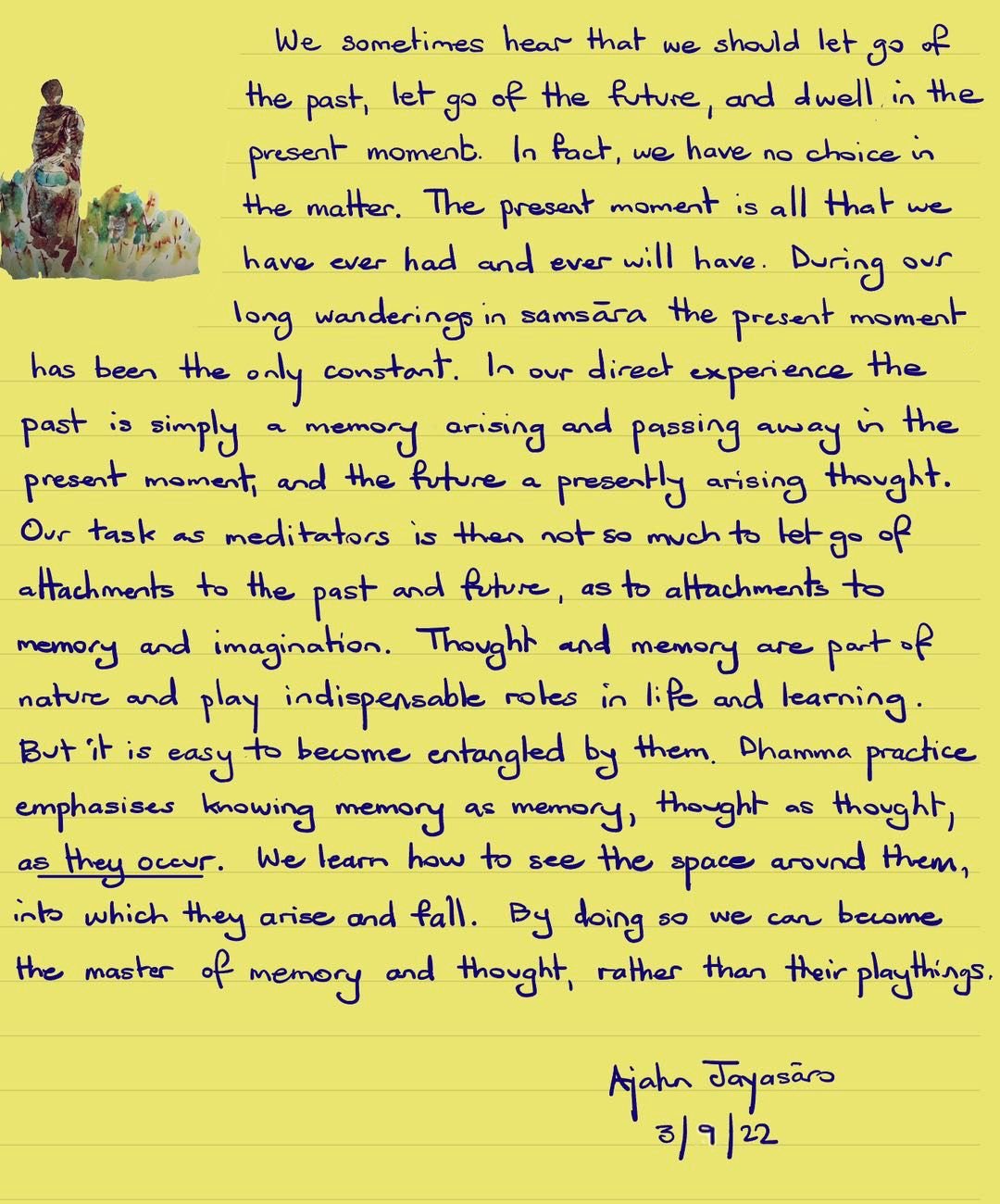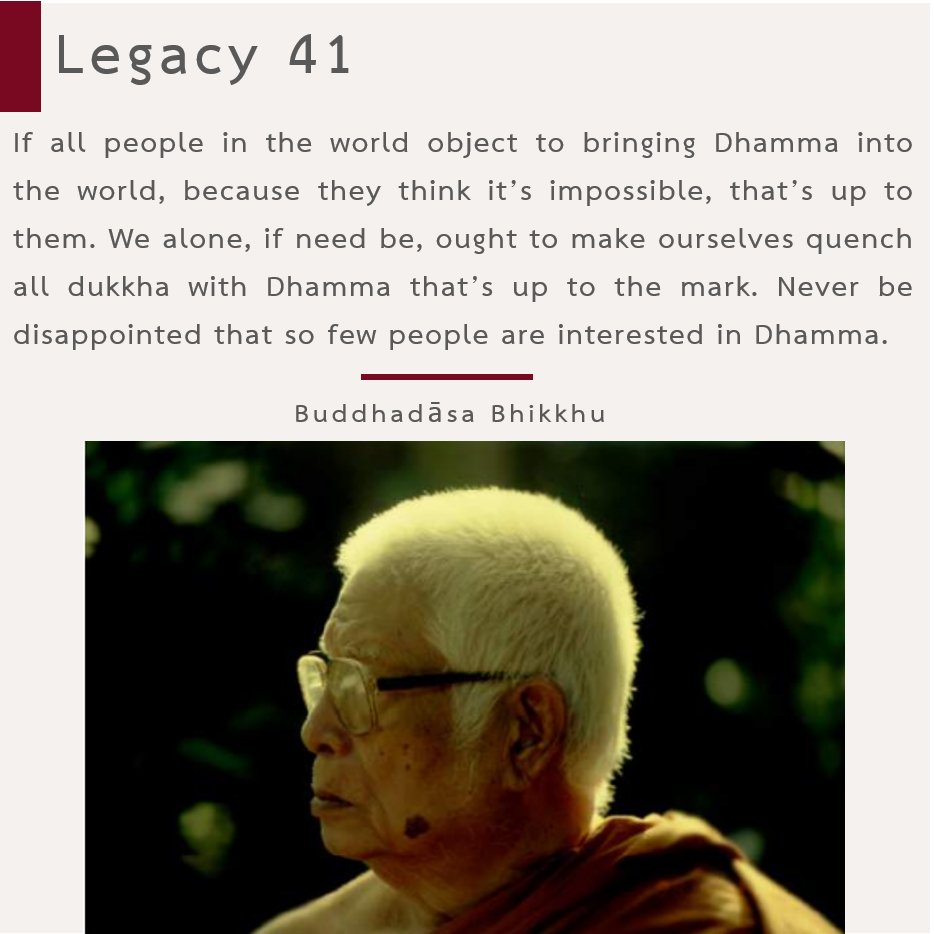
Dhamma Online
Our experience of the world may be divided into two categories: things such as height and weight that can be measured and things such as love and hate that cannot.
In high school I remember being much impressed by a cartoon illustrating some words of Leo Tolstoy. In the cartoon, a fat well-dressed man crosses a stream sitting on the back of a poor emaciated man in rags,
A rough assessment of our progress in Dhamma practice may be gained by observing to what extent the number of things that make us suffer has decreased
Forest monks are encouraged by their teachers to remind themselves everyday of all the ways that their life could suddenly change for the worse.
In 1977, a remarkable video was released. It was called ‘Powers of Ten’. In it, the aerial view of a couple picknicking in a Chicago park starts drawing back by factors of ten: 10m, 100m, 100km …
One of the most important supports for effective learning is timely and detailed feedback. One of the reasons that meditation practice can be such an excellent means for studying …
In our Dhamma practice, consistency and continuity are vital. They are what are required to create the momentum we need to push past the defilements.
Five areas in which to practise mindfulness of the speech of ourselves and others:
The suitability of time and place for the conversation
The truthfulness of the words spoken
We sometimes hear that we should let go of the past, let go of the future, and dwell in the present moment. In fact, we have no choice in the matter.
Today: an old story. In America, two brothers become gangsters. Once they’re rich and successful they start to make generous donations to a foundation for poor children run by their local church.
In one of the great satires of religious superstition, a reluctant messiah is becoming exasperated by all the people following him around: “You don’t need to follow me. You don’t need to follow anybody!
The Dhamma is straightforward. The problem is that our minds are crooked. The Dhamma tells us to see hair as hair, nails as nails, teeth as teeth and skin as skin.
Kindness without wisdom can sometimes do more harm than good. Kindness guided by wisdom is more effective because it takes into account the overall and long-term welfare of the person to whom we feel kind.
On one occasion the Buddha spoke about the way people reveal themselves through the way in which they talk about themselves and others:
I have been blessed with some wonderful teachers in my life. By observing them I have come to some conclusions as to the qualities of a good teacher. Here are a few of them.
Training the mind may be compared to raising a young child. Just as the well-being of their child is always of primary importance to mothers, the well-being of the mind must always be of primary importance to Dhamma practitioners.
If all people in the world object to bringing Dhamma into the world, because they think it’s impossible, that’s up to them. We alone, if need be, ought to make ourselves quench all dukkha with Dhamma that’s up to the mark. Never be disappointed that so few people are interested in Dhamma.
Thought in itself is not an enemy of meditation. It is a natural phenomenon. It becomes a problem when we are unaware of thought as simply thought, grasp onto it and give it an undeserved significance.
May we all cherish one special aim, that whether sooner or later, there will be an era in which the world is perfect in Dhamma through everyone performing their duties, through everyone being clearly mindful in their hearts that the correct duty is itself the Dhamma that will help keep us above all problems.
Where in the world is the good person to be found? Ultimately, there is no such thing. But what does exist,
“Beauty is in the corpse, goodness is in giving up, the monk is in truth, Nibbāna is in dying before death.” We have knocked the dust off of and recycled this antique saying in order to preserve the intelligence of our ancestors,to show how sharp, direct, and profound their understanding was.
When we think of our mistakes in the past unwisely, we make ourselves the villain. We think “I was so bad. I am so bad.”
In most academic tests, students can safely trust that all the questions on the exam sheet have answers, and that they possess (providing they have revised well) all the knowledge necessary to answer them.
Feeling powerless and without choices is depressing. But having too many choices can cripple us. When there are a great many options available,
In order to let go of defilements we have to see them, and to see them without any sense of ownership or identification with them.
The discourses of the great teachers in the Thai Forest tradition often included martial imagery. Defilements are referred to as our bitter enemies,






























